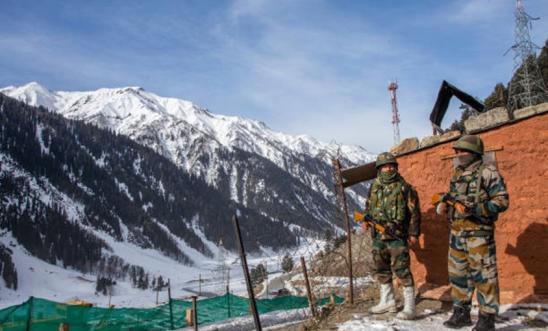
TOURISTS ARE SAFE IN KASHMIR BUT NOT KASHMIRIS

Written by Cherry Bird with Ahmad* and Mysha*
If you read the headlines of tourism magazines and reports you would believe Kashmir is now a peaceful and happy place, with no remaining problems since the Indian government revoked the special status of Jammu and Kashmir as India’s only Muslim majority state in 2019. Its subsequent downgrading to two Union Territories ruled directly from Delhi sparked widespread protests from Kashmiris, which were harshly repressed with massive militarisation, curfews, arrests and surveillance. But now the Indian authorities lead us to believe all is calm and life is good for Kashmiris – India is bringing “development” to the region by opening it up and investing millions in infrastructure.
Traditionally tourism has been an important part of the economy of the region, representing around 7% of GDP, and based on the scenic beauty (trekking and ski-ing) and a rich cultural heritage that attracts both Hindu and Muslim pilgrims. An Indian tourist was quoted as saying “Kashmir is heaven”. After a significant dip in 2019/20, tourism is now on the increase again and being hugely promoted by the authorities as part of a charm offensive. Overall visitor numbers are quoted at around 18 million in 2022, rising to 20 million in 2023, mostly from other Indian states. More significantly, the number of foreign (non-Indian) visitors is reported by the tourism department to have risen by 700%, from 4,028 in 2022 to 30,647 in 2023. Many of the Indian tourists are pilgrims, visiting ancient sites associated with Hindu mythology and elaborate new Hindu temples, which are being constructed at key sites to reinforce the dominance of the BJP Hindutva philosophy. At the G20 meeting held in Kashmir, plans were announced to further promote tourism and to attract more film makers. So successful has the initiative been that capacity of the Kashmir valley is becoming over-stretched, risking environmental damage and social problems. But anyone who comments on this is likely to face consequences from the authorities. So, Kashmiris must quietly accept the inevitable changes to their land.
That is because, not far under the surface is a culture of fear. The apparent peace is an enforced peace, the result of continuing huge militarisation, with Indian soldiers prominent on the streets 24/7 and punishment, such as house raids and arbitrary arrest, for those who speak out. After a recent visit, Ahmad* says there is no space for any kind of discussion, much less protest, even about topics such as local news or social issues. People who have been neighbours and friends for years are afraid to trust each other by speaking freely, even indoors, lest they be overheard or something be inadvertently passed on. Another change is that, in earlier times, if someone’s house was raided or burgled, neighbours would call round the next day to help and provide comfort. Now, everyone stays away, afraid to be associated with whatever misdemeanour might have caused the incident. It is said that communities have changed forever.
Social media is also not safe, and Ahmad told me that no-one writes anything anymore, even about everyday news. There is no room for even democratic political discussion, only pro-India information can safely be shared, and specifically pro-BJP. Complete submission to the BJP authorities has been created through a comprehensive system of surveillance, based on a detailed census form, questionnaire and use of drone mapping technology, all administered by the Indian army, rather than civilians, to establish and record every detail of where each citizen lives and where their relatives are. An example was given of an acquaintance who had relatives in Pakistan, whom he had visited every year over many years. After returning from his most recent visit he was detained and has been held in prison in India for over a year. Many Kashmiris have now moved abroad, taking whatever opportunities are available, but they are still on the radar, with families threatened if they criticise India.
So, when someone asks if it is it safe to go to Kashmir as a tourist, the answer is, yes tourists are safe in Kashmir, but Kashmiris live in fear of a knock on the door.
*Names changed for their security
Our blogs are written by Amnesty International staff, volunteers and other interested individuals, to encourage debate around human rights issues. They do not necessarily represent the views of Amnesty International.
0 comments